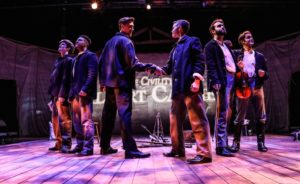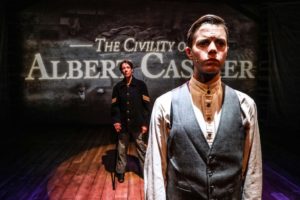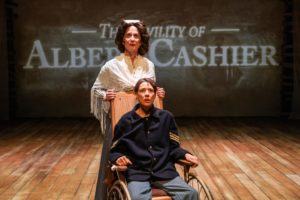
 RECOMMENDED*** One of the many unsung heroes of the Civil War in the United States is getting his long overdue and utterly fascinating life’s story told in the new musical “The CiviliTy of Albert Cashier.” Having been previously workshopped at The Chicago Musical Theater Festival at Victory Gardens and also in staged readings at the LGBT Center for the Arts in Los Angeles the piece is currently enjoying its world premiere by Permoveo Productions, in association with Pride Films and Plays, at Stage 773. 3 and 1/2 SPOTLIGHTS
RECOMMENDED*** One of the many unsung heroes of the Civil War in the United States is getting his long overdue and utterly fascinating life’s story told in the new musical “The CiviliTy of Albert Cashier.” Having been previously workshopped at The Chicago Musical Theater Festival at Victory Gardens and also in staged readings at the LGBT Center for the Arts in Los Angeles the piece is currently enjoying its world premiere by Permoveo Productions, in association with Pride Films and Plays, at Stage 773. 3 and 1/2 SPOTLIGHTS
Jay Paul Deratany, who wrote the book for this musical, has clearly done extensive research into Albert Cashier’s entire biography. Initially conceived of as a dramatic piece, the script was written by Deratany in response to the abuses committed against the LGBTQ community worldwide. An avid reader of the website Human Rights Watch, the former lawyer and human rights advocate stumbled upon some information regarding Albert Cashier and has created a glowing tribute to his memory in this work. Upon completion of his script he contacted director Keaton Wooden, who decided to turn this project into a musical. Wooden, who is also a co-composer, enlisted the help of acclaimed musician and trans composer Joe Stevens to complete the music and lyrics. Stevens, who was a member of the group Coyote Grace from 2006 to 2012 and is also featured in the current documentary “Real Boy,” has certainly stamped his considerable musical talents on this production.
The action of the play spans the years 1862 to 1915 and is set, primarily, in Quincy, a small town in southern Illinois. Albert Cashier, as an ailing war veteran nearing the end of his life, is spending his final days confined to a hospital and fighting off not only his old demons but also early signs of dementia. Those demons are the ghosts of so many of Albert’s friends and fellow soldiers he saw killed in action that still haunt him daily. Old Albert (Katherine Condit) dreams of when he first arrived in America from Ireland with all of the hope and ambition that this great country offered to him as Young Albert, played by Dani Shay, the former star of “The Glee Project” and contestant on “America’s Got Talent.” But Old Albert refuses to take a bath or let his irritable Nurse (Delia Kropp) bathe him. The reason for this is that Albert harbors a secret, something that he’s been hiding his entire life. For you see, Albert Cashier was actually born to his Irish immigrant, working-class parents as Jennifer Hodgers. How he brilliantly kept his secret, cleverly joined the ranks of the U.S. military and fought valiantly in more than 40 engagements during the Civil War makes for some very thrilling and entertaining theater indeed.
While the entire cast does solid work, there are two performances that really stand out. Cameron Armstrong, who plays Walter, the young African-American soldier who has joined Albert’s regiment in the hopes of being a medic, brings such joy and enthusiasm to his performance that was even in evidence during the final curtain call. Mr. Armstrong makes the most of his limited time on stage. It’s a shame that he is only utilized for Act I. He has, quite possibly, the strongest moment in that act during his solo number “Following the Sound.” Also creating a very strong presence here is Billy Rude, who plays Jeffrey. Thanks to Mr. Rude’s finely nuanced performance we see Jeffrey as a young man who may not be the brightest individual but is good-natured, loves to talk and is conflicted by his very strong feelings for Albert. Those yearnings grow over the course of the show and make Jeffrey question his own sexual identity, which ultimately he accepts, assuming that Albert is a man and that he is in love with him. All of this is expressed wonderfully in Mr. Rude’s solo number “Excuse Me Sir” in Act II. Jeffrey and Young Albert also sing about the elusive possibilities of living a happy life together in the heartbreaking duet “The Perfect Home.”
It is in the second act of this musical that the book becomes strongest. The score is buoyant and effective throughout. While it features recreations and adaptations of historical Civil War songs, the original music seems to be heavily influenced by mid-1990’s material released by Melissa Etheridge or the Indigo Girls. This is a perfect fit for the material and transports us melodically into this folk/Americana world and era. The very sparse and bare set design by Jeremy Hollis may be the best use of this thrust stage that I have ever seen in this space. His simple muslin backdrops not only mask the orchestra pit but also have a heavy symbolic moment when they are ripped down at the dramatic conclusion of Act I. Plus they also act as a screen upon which Projections Designer G. “Max” Maxin IV is allowed to illustrate dozens of photographs and picture perfect images which give this show an effective and embellishing added layer of authenticity.
“The CiviliTy of Albert Cashier” is essential viewing for anyone who has an interest in LQBT history as well as a very solid entry into the ever-increasing number of new musicals that are being created and developed right here in the city of Chicago.
“The CiviliTy of Albert Cashier” runs through October 15th at Stage 773, 1225 Belmont Avenue, Chicago.
Running time is 2 hours, 25 minutes, with an intermission.
Performances are:
 Wednesdays and Thursdays at 7:00 pm
Wednesdays and Thursdays at 7:00 pm
Fridays and Saturdays at 8:00 pm
Sundays at 4:00 pm.
Tickets are $40. FYI www.albertcashierthemusical.com; tickets www.stage773.com.
To see what others are saying, visit www.theatreincicago.com. go to Review Round-Up and click at “The Civility of Albert Cashier”






More Stories
“The Secret Garden”
“Yippee Ki Yay” The Parody of Die Hard reviewed by Frank Meccia
“Throbbin Wood” reviewed by Julia W. Rath